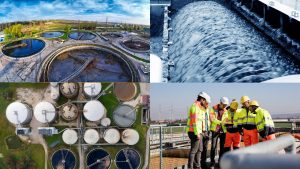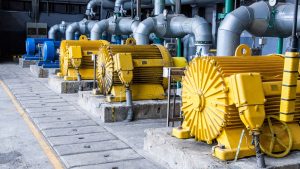Chemicals are a common industry-specific strategy used during the wastewater purification and treatment process in Australia. Although there are certain grids of guidelines and standards for this to occur, sometimes wastewater plant authorities encounter difficulties in determining the exact chemical varieties, quantities, and chemical processes when executing wastewater treatment. This is why the digital industrial world has now concentrated on employing robust software solutions like ‘Chemical Control Systems’ in the wastewater realm.
In this article, we will explore the utilisation of Chemical Control Systems and their benefits for wastewater production in Australia.
In this article, we will explore the utilisation of Chemical Control Systems and their benefits for wastewater production in Australia.
What are Chemical Control Systems?
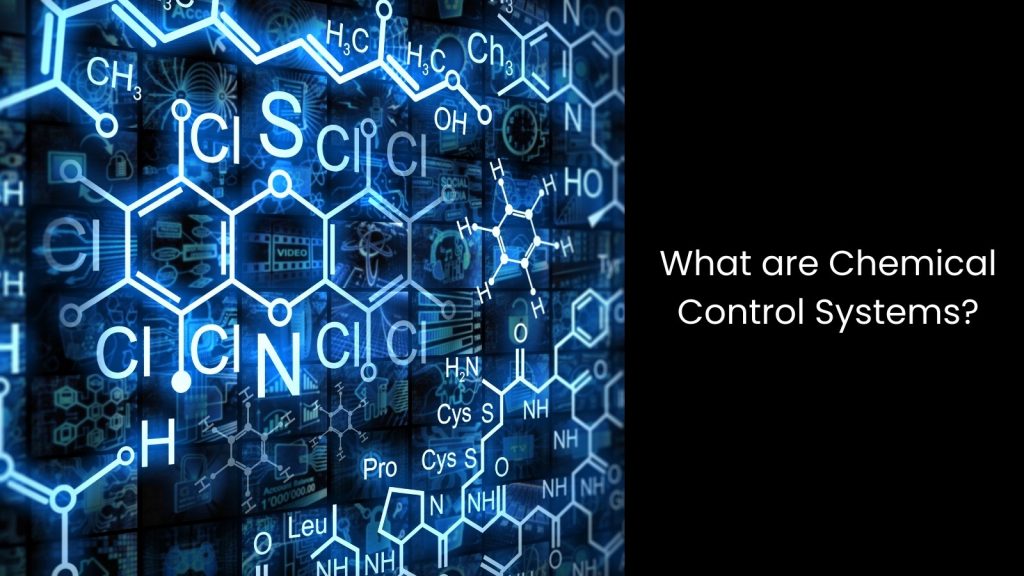
- If this is put in a simple format for you, these are like the computerised brains of water treatment plants. These help to manage the chemicals used to clean and purify water.
- You know that the wastewater industry is where used water has been recycled and purified for reuse. In this sector, they need to use a massive amount of chemicals for a diverse range of tasks.
- These systems are crucial for maintaining water quality and safety. Let us explain how.
- Without proper chemical control, water treatment can become complex and unpredictable. It is a certain fact that some complicated challenges arise, such as inconsistent treatment results. On the other hand, excessive chemical use will lead to higher costs, and this will cause even more potential harm to the environment due to improper dosing of chemicals.
- However, chemical control systems tackle these problems head-on.
- They ensure the right amount of chemicals is added to the water at the right time, keeping the treatment process efficient and effective.
- These powerful solutions come out with robust features. With features like real-time monitoring and automated adjustments, these systems provide a reliable way to consistently maintain water quality standards.
- It is a smooth process for the wastewater industry in Australia to execute their wastewater production without errors. These solutions help industries meet regulatory requirements, minimise waste, and protect both workers and the environment.
The Top 5 Benefits of Chemical Control Systems in Wastewater Industry
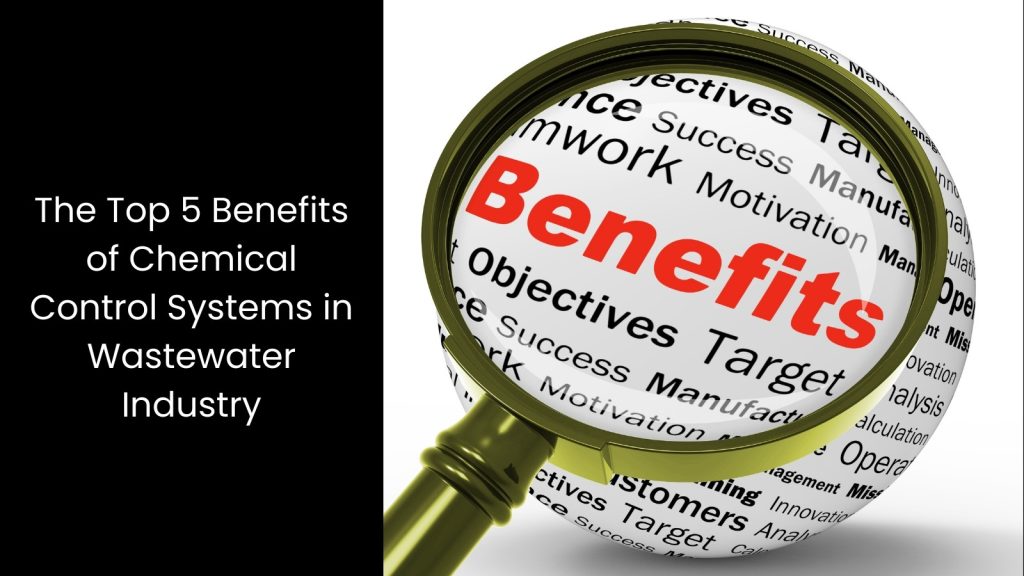
Precise Dosage
Do you know why the wastewater industry puts so much weight on this certain fact?
That is because precisely dosing chemicals in wastewater treatment is crucial to ensuring effective purification without wasting resources or causing harm. If the wrong dosage is used, several problems can arise.
There are two aspects to them such as overdosing and underdosing. Too little chemical might result in inadequate treatment, leading to the release of harmful pollutants into the environment. On the other hand, excessive chemical dosage can be wasteful, expensive, and even risky to aquatic ecosystems.
Those days, wastewater plants faced challenges in determining precise chemical dosages due to fluctuating influent characteristics, such as varying pollutant levels and flow rates. Not to mention that manual dosing methods are prone to human error and have problems adapting quickly to changing conditions.
However, when chemical control systems are in the scenario, they utilise advanced technologies like sensors and automation to continuously monitor influent parameters. With the insights received through the sensors, the wastewater authorities can adjust chemical dosages accordingly in real time.
That is because precisely dosing chemicals in wastewater treatment is crucial to ensuring effective purification without wasting resources or causing harm. If the wrong dosage is used, several problems can arise.
There are two aspects to them such as overdosing and underdosing. Too little chemical might result in inadequate treatment, leading to the release of harmful pollutants into the environment. On the other hand, excessive chemical dosage can be wasteful, expensive, and even risky to aquatic ecosystems.
Those days, wastewater plants faced challenges in determining precise chemical dosages due to fluctuating influent characteristics, such as varying pollutant levels and flow rates. Not to mention that manual dosing methods are prone to human error and have problems adapting quickly to changing conditions.
However, when chemical control systems are in the scenario, they utilise advanced technologies like sensors and automation to continuously monitor influent parameters. With the insights received through the sensors, the wastewater authorities can adjust chemical dosages accordingly in real time.
Improved Water Quality
Whatever the procedures a wastewater plant practices, the ultimate goal should be producing quality water that meets Australian and global water industry standards.
Water quality is something that receives much attention in wastewater treatment, as it directly impacts human health and the environment. If wastewater quality standards are breached, several negative consequences can occur.
If we look into them, we see that untreated or poorly treated wastewater can contain harmful pollutants and pathogens, posing risks to public health if released into water bodies used for drinking or recreation. Plus, environmental damage can result from the discharge of pollutants into ecosystems. It is unnecessary to emphasise that the latter leads to the degradation of aquatic habitats and the decline of biodiversity.
Since wastewater plants encountered challenges adhering to quality standards due to the complexity of treating diverse influent streams and the need to meet stringent regulatory requirements, Chemical Control Systems came into the spotlight. However, chemical control systems offer an effective solution. These systems can precisely dose certain chemicals and optimise treatment processes. With the right amount of chemicals in use, these systems improve water quality by removing contaminants and pathogens more efficiently.
Water quality is something that receives much attention in wastewater treatment, as it directly impacts human health and the environment. If wastewater quality standards are breached, several negative consequences can occur.
If we look into them, we see that untreated or poorly treated wastewater can contain harmful pollutants and pathogens, posing risks to public health if released into water bodies used for drinking or recreation. Plus, environmental damage can result from the discharge of pollutants into ecosystems. It is unnecessary to emphasise that the latter leads to the degradation of aquatic habitats and the decline of biodiversity.
Since wastewater plants encountered challenges adhering to quality standards due to the complexity of treating diverse influent streams and the need to meet stringent regulatory requirements, Chemical Control Systems came into the spotlight. However, chemical control systems offer an effective solution. These systems can precisely dose certain chemicals and optimise treatment processes. With the right amount of chemicals in use, these systems improve water quality by removing contaminants and pathogens more efficiently.
Cost Efficiency
It is necessary to ensure the efficient use of resources in wastewater plants while maintaining effective treatment processes. If wastewater plants exceed their budget limits, several adverse consequences will arise for sure.
Cost savings can be achieved by planning chemical dosages, purchasing them, and applying them correctly. You know that wastewater plants find it difficult to precisely purchase chemicals. The main reason for this is that over-purchasing leads to unnecessary expenses, and under-purchasing can result in treatment inefficiencies or non-compliance with regulations.
If they have a Chemical Control System in place, it will offer an optimal solution to these challenges by promoting cost efficiency.
These systems utilise advanced technologies to monitor chemical usage in real time, ensuring precise dosing and minimising waste. Since they can optimise chemical usage, chemical control systems help wastewater plants reduce operational costs and stay within budget limits. Not to mention that it helps allocate resources more effectively.
On one hand, Chemical Control Systems optimise quality management, and on the other hand, they help with financial management within the wastewater framework.
Cost savings can be achieved by planning chemical dosages, purchasing them, and applying them correctly. You know that wastewater plants find it difficult to precisely purchase chemicals. The main reason for this is that over-purchasing leads to unnecessary expenses, and under-purchasing can result in treatment inefficiencies or non-compliance with regulations.
If they have a Chemical Control System in place, it will offer an optimal solution to these challenges by promoting cost efficiency.
These systems utilise advanced technologies to monitor chemical usage in real time, ensuring precise dosing and minimising waste. Since they can optimise chemical usage, chemical control systems help wastewater plants reduce operational costs and stay within budget limits. Not to mention that it helps allocate resources more effectively.
On one hand, Chemical Control Systems optimise quality management, and on the other hand, they help with financial management within the wastewater framework.
Enhanced Safety
Safety is a top concern in wastewater treatment scenarios, as working with chemicals is required. It is a huge responsibility of the wastewater authorities to protect workers, the environment, and public health while aligning with their production goals.
There is no forgiveness when working with these harsh chemicals if something goes wrong. For instance, accidental spills or leaks of chemicals can result in harmful exposure to workers, causing injuries or long-term health effects. Moreover, improper handling or storage of chemicals can lead to environmental contamination, polluting water bodies and endangering aquatic ecosystems.
However, chemical control systems offer an effective solution for this. These systems incorporate safety features such as automated dosing, leak detection, and emergency shutdown procedures to minimise risks and prevent accidents.
With their capacity to promote safe practices and provide real-time monitoring of chemical handling processes, chemical control systems enhance safety in wastewater treatment operations.
It is no surprise that wastewater authorities find this a must-have tool in order to protect workers and the environment while maintaining efficient treatment processes.
It is more like an all-in-one tool.
There is no forgiveness when working with these harsh chemicals if something goes wrong. For instance, accidental spills or leaks of chemicals can result in harmful exposure to workers, causing injuries or long-term health effects. Moreover, improper handling or storage of chemicals can lead to environmental contamination, polluting water bodies and endangering aquatic ecosystems.
However, chemical control systems offer an effective solution for this. These systems incorporate safety features such as automated dosing, leak detection, and emergency shutdown procedures to minimise risks and prevent accidents.
With their capacity to promote safe practices and provide real-time monitoring of chemical handling processes, chemical control systems enhance safety in wastewater treatment operations.
It is no surprise that wastewater authorities find this a must-have tool in order to protect workers and the environment while maintaining efficient treatment processes.
It is more like an all-in-one tool.
Real-time Monitoring and Control
When processing complex work structures like chemical dosing and execution, real-time data is a top necessity yet something difficult to obtain.
If wastewater plants do not receive real-time information on chemical usage and control, it will be the foundation for several issues. For instance, without immediate feedback on chemical dosing rates, operators might struggle to adjust treatment processes promptly. This will lead to inefficiencies or even treatment failures.
Moreover, delays in detecting equipment malfunctions or chemical spills can exacerbate safety risks and environmental impacts. The main reason that wastewater management finds it challenging to receive real-time chemical-related information is due to the complexity of integrating data from various sensors and control systems.
However, chemical control systems utilise advanced technologies to continuously monitor key parameters such as chemical concentrations, flow rates, and treatment performance. As they are developed to consolidate real-time information, chemical control systems empower operators to make timely decisions. This encouragement will help optimise treatment processes and respond promptly to emergent situations.
If wastewater plants do not receive real-time information on chemical usage and control, it will be the foundation for several issues. For instance, without immediate feedback on chemical dosing rates, operators might struggle to adjust treatment processes promptly. This will lead to inefficiencies or even treatment failures.
Moreover, delays in detecting equipment malfunctions or chemical spills can exacerbate safety risks and environmental impacts. The main reason that wastewater management finds it challenging to receive real-time chemical-related information is due to the complexity of integrating data from various sensors and control systems.
However, chemical control systems utilise advanced technologies to continuously monitor key parameters such as chemical concentrations, flow rates, and treatment performance. As they are developed to consolidate real-time information, chemical control systems empower operators to make timely decisions. This encouragement will help optimise treatment processes and respond promptly to emergent situations.
Transforming Wastewater into Quality Water via Chemical Control Systems
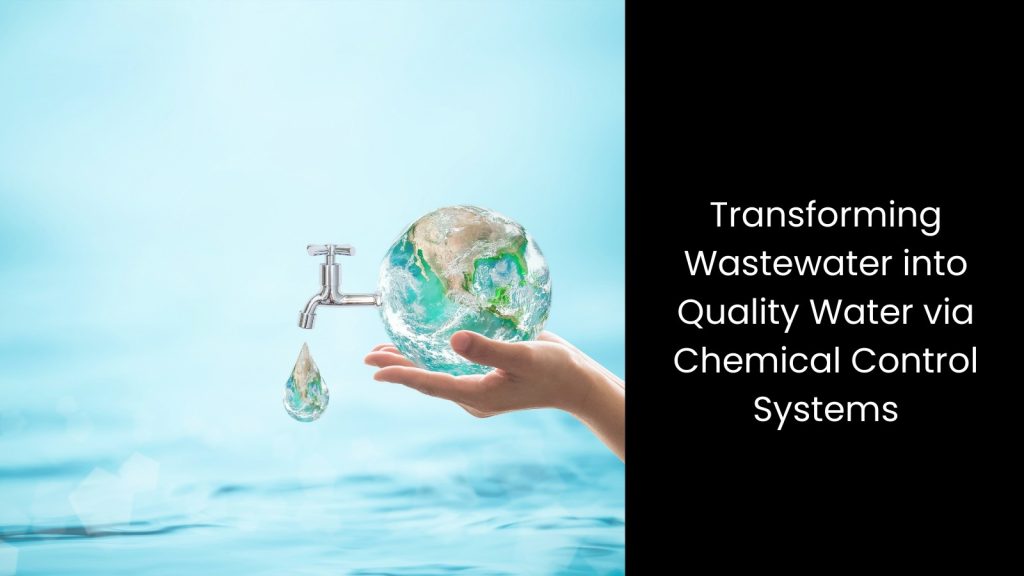
The Chemical Control System’s requirement in the wastewater scenario is simply impressive due to its features and functionalities. However, you need to check whether the Chemical Control System embedded asset solution you are planning to purchase aligns well with your industry requirements. Collaborating with a reputed software provider will keep these worries at bay for sure.




